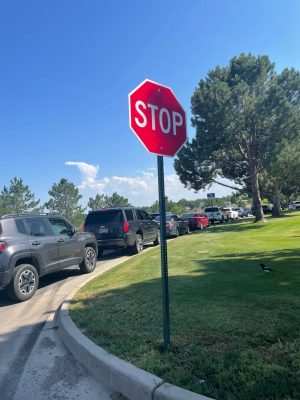Administration Says Self Defense Isn’t An Excuse When It Comes To Fighting At Creek
For many Creek students, self defense in a fight seems like a realistic option; however, Creek deans say self defense is rarely applicable. “Really, in the 11 years [I’ve been a dean], even going back to middle school, I feel like there’s always an opportunity to avoid a situation like that,” dean Brock Felchle said. Nonetheless, students continue to say they would defend themselves or a friend despite the consequences. “If someone was trying to hurt someone close to me, I wouldn’t want to stand for that,” sophomore Muhammad Aweys said.
August 31, 2021
You’re outside and see another student punching your friend, so you try to help by shoving the other student off of them. One day later, you’ve been suspended.
Suspending all students involved in a fight is the standard Creek policy for fighting when at school. But it’s significantly different from other districts such as Aurora Public Schools’ (APS) policies, which allows students to use self defense in some cases, and it’s disliked by many students.
When a fight breaks out at Creek, the five deans are responsible for looking into what happened. Student Support Teams, a group made of a counselor, dean, psychologist, and nurse, spend time discussing the circumstances of the fight and deciding on disciplinary action.
“We get numerous witness statements, statements from the students that were involved, and any other evidence,” Dean Brock Felchle said.
Yet Creek deans feel fighting, and self defense, can usually be avoided.
“Really, in the 11 years [I’ve been a dean], even going back to middle school, I feel like there’s always an opportunity to avoid a situation like that,” Felchle said.
Some students believe the disciplinary actions taken by deans in cases that seem like self defense are a bit unjust.
“[The student] was obviously provoked somehow,” senior Sydney Bar-Or said. “It’s only fair that they’re able to fight back.”
In APS students are able to fight back in some cases without repercussions.
According to the APS Student Discipline / student conduct and discipline code, in the case of fighting that results in 3rd degree assault, a planned and taken out action of harm against another person, “self defense may be a defense to the offense or assault.”
“I think [self defense] is a concept that people should be able to agree on,” senior Griffin Terry said. “If you’re provoked or attacked, you should be able to defend yourself – that’s just a common sense thing to allow.”
Morally, however, is that the only way to define self defense? What about defending someone close to you?
“If someone was trying to hurt someone close to me, I wouldn’t want to stand for that,” sophomore Muhammad Aweys said.
And, many students said they would still help their friends, even if they knew they would be suspended.
“I would still [defend them] because the other person is hurting people,” freshman Marshall Dunrud said.
Despite what the students believe, if Creek deans believe there was no fighting necessary, they usually don’t consider self defense in their investigation.
Instead, they look to school policies that can be found in each student’s Bear Facts. In cases of fighting, policies JICDB1 and ACC-R are most commonly referenced because they apply to any sort of harmful contact between students and explain how a student can violate one of these policies as well as the potential consequences.
“I would say we are consistent [in disciplinary action],” Felchle said.
When trying to give every student equal consequences, there isn’t room to apply self defense to justify a student’s part in a fight to potentially keep them from being suspended.
“Self defense – we obviously get that a lot, and I understand that that’s a valid argument at times, but we also look at was there an opportunity for a student to remove themselves from the situation,” he said. “I would look at self defense as, ‘I’m in a corner, there’s no adults around, I don’t know where to go.”
As it is right now, Creek will suspend you for defending yourself or someone else. So if you are involved in a fight at Creek, here’s what to expect:
Once the students have been punished by the school, they will continue to go to school together – unless one was expelled. The deans and Assistant Principal Kevin Uhlig have a process to make it possible for the students to get along or, at a minimum, tolerate attending school together.
“We might do what’s called a Restorative Justice Conference if we feel like both kids are open to it,” Uhlig said. “Then we can see if we can agree on something – see if we can set some boundaries.”
Yet, Uhlig said, “[if one of the students is thinking], yeah I will, but if he pops off, I don’t know what’s gonna happen,” the deans can choose an alternative way of integrating both students back into school.
In this case, they put the students involved on a No Contact Order. This means all students in the order cannot text, talk, or communicate in any way with the students they fought. If a dean hears from a witness, has a report, or sees footage of one of the students contacting the other, that student can be suspended for an additional five days.
Overall, if you don’t want a suspension on your school record, it’s best to go out of your way to avoid any sort of physical altercation with another student because Creek will still suspend you if you fight back.
“Fortunately, fighting doesn’t happen very frequently [at Creek],” Uhlig said.

![For many Creek students, self defense in a fight seems like a realistic option; however, Creek deans say self defense is rarely applicable. “Really, in the 11 years [I’ve been a dean], even going back to middle school, I feel like there's always an opportunity to avoid a situation like that,” dean Brock Felchle said. Nonetheless, students continue to say they would defend themselves or a friend despite the consequences. “If someone was trying to hurt someone close to me, I wouldn’t want to stand for that,” sophomore Muhammad Aweys said.](https://unionstreetjournal.com/wp-content/uploads/2021/08/IMG_3367-900x862.jpeg)






















David Ojima | Dec 16, 2024 at 4:54 PM
What about only using suspension if the incident is repeated within the party? Not on the first time, but only if the incident is repeated. Of course though, if there is evidence to suggest an initiator of a fight, use it properly.
Steve | Apr 19, 2024 at 2:53 PM
Always go out of your way to find an authority. Authority solves all problems. Spoken like a true authoritarian.
rylee | Mar 6, 2023 at 8:52 AM
they should let kids defend them selves in fights or if they are attacked in schools